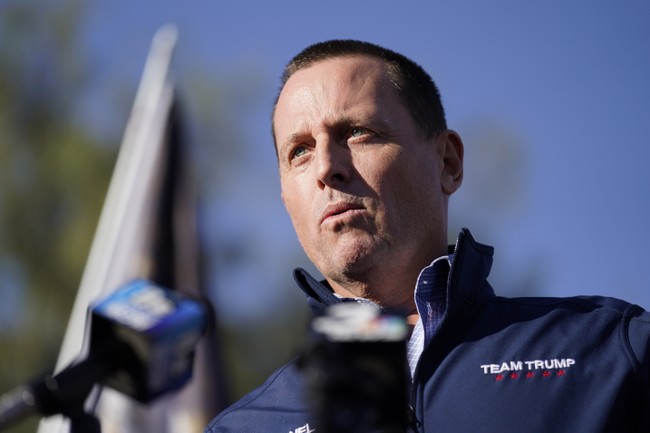


Ambassador Ric Grenell scored a significant diplomatic victory last month for President Donald Trump and the United States in Venezuela. Remarkably, President Trump has achieved more in the Western Hemisphere in his first month in office than his predecessor did in four years.
Grenell convinced Venezuela’s strong man, Nicolas Maduro, to release six American hostages. He also persuaded Maduro to embrace the return of illegal Venezuelan migrants from the U.S. The first return flights started last week, and Grenell was there to see the migrants off.
The Venezuelan government and many of its officials are subject to comprehensive U.S. sanctions. So too is its oil and gas company PDVSA. The U.S. Department of the Treasury uses licenses and case-by-case exceptions to authorize certain oil projects that would otherwise be sanctioned. Each project license requires the private company to control all key aspects of oil production, export, and revenues. The approach only allows payment of royalties and taxes at the lawful rates to the Venezuelan Central Bank in the local currency of bolivars. Currently, U.S. oil giant Chevron is the primary beneficiary of this policy.
The entire world knows that the Maduro regime is illegitimate, illegal, and corrupt. Venezuela is undergoing an internal political evolution that will take time for Venezuelans to resolve. As the new administration reorients U.S.-Venezuela policy, there is an opportunity to focus on American interests first. Those interests include restoring democracy to the country and the issues Grenell pursued but also sending the Chinese, Russians, and Iranians, who have all set up shop in Caracas, packing.
Recommended
Maximum economic sanctions have not changed the regime in Venezuela. The worse the economy fares, the more likely it is that working-class and middle-class Venezuelans will migrate for economic reasons. The Trump Administration can help drive democratic reform in Venezuela by adopting policies that encourage Venezuelans to remain or go back home and pressure the regime for change. This also will help the opposition in Venezuela.
China, Russia, and Iran intend to expand their influence in the Western Hemisphere and look to Venezuela, with its vast natural resources, as the place to make a stand. They hope that when U.S. companies are frozen out of Venezuela, their puppet energy companies can fill the vacuum. Our adversaries expect to exert great influence over the Venezuelan government through their energy companies.
For example, the Russian company Rosneft Trading essentially took control of all oil exports from Venezuela when the nation was sanctioned in February 2020. Through the takeover, Russia was able to recoup billions in debts owed to Venezuela for loans and military equipment.
Iran became Venezuela's sole source of diluent, which is essential for producing heavy oil. Between July 2021 and July 2023, Venezuela imported over 35 million barrels of Iranian condensate as diluent used to produce some 350 million barrels of heavy oil. Iran, in turn, was paid with 47 million barrels of oil, which it routed to China clandestinely and at steep discounts. The relationship with Iran also facilitated the infiltration and funding in Latin America of Hezbollah and other Iranian terrorist groups.
When the Western companies departed Venezuela or returned their activities to minimal maintenance, PDVSA stepped in and took over the oil operations. Because sanctions precluded buyers from the U.S. and allied countries from purchasing Venezuelan oil, PDVSA shipped the oil to China through shady networks of companies and vessels that fleeced the Venezuelan people. For example, in 2021, China imported 153 million barrels of heavily discounted Venezuela oil with a market value of $7.8 billion. Today China continues to press Venezuela for payment of its estimated $10-20 billion in debt through oil exports.
Using licenses under the current sanctions regime can limit our adversaries’ options when it comes to Venezuela. If companies operating in Venezuela can source the diluent in the United States, we can displace Iran from the market. U.S. naphtha, a choice diluent, which is in ample supply, can be sent to Venezuela to the great benefit U.S. refiners. We saw in 2024, under the licenses, U.S. companies supplied 23 million barrels for Venezuela, valued at about $1.2 billion.
In just under a month, the U.S., under President Trump, has demonstrated that through strength it will advance its interests in the Western Hemisphere. Keeping sanctions against Venezuela in place, while at the same time, granting American and partner nation companies licenses is tough and smart. It keeps Venezuelan oil in our hemisphere and helps keep Chinese, Russian and Iranian companies out. The United States also maintains leverage over the Maduro regime under this approach to promote democracy and to drive hard diplomatic bargains like those recently achieved by President Trump’s special envoy, Grenell.
Ambassador Robert C. O’Brien (ret.) was the 27th U.S. national security advisor from 2019-2021 and he currently serves as chairman of American Global Strategies LLC.

